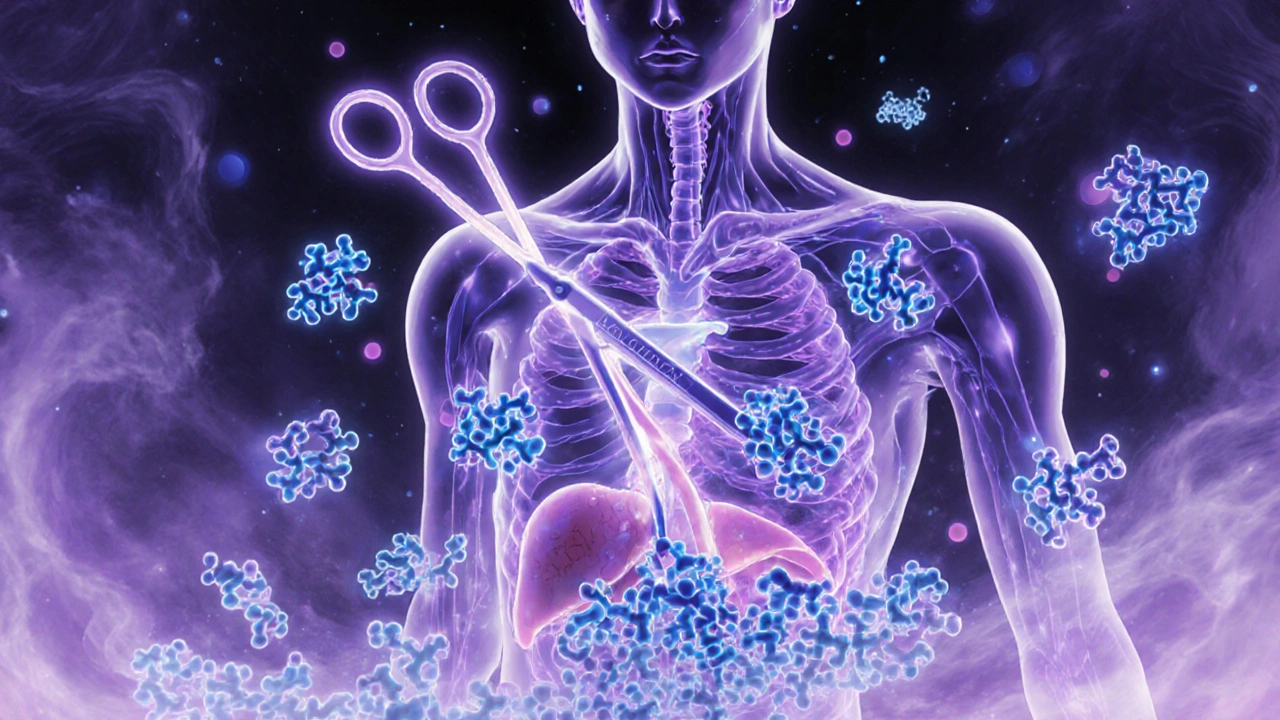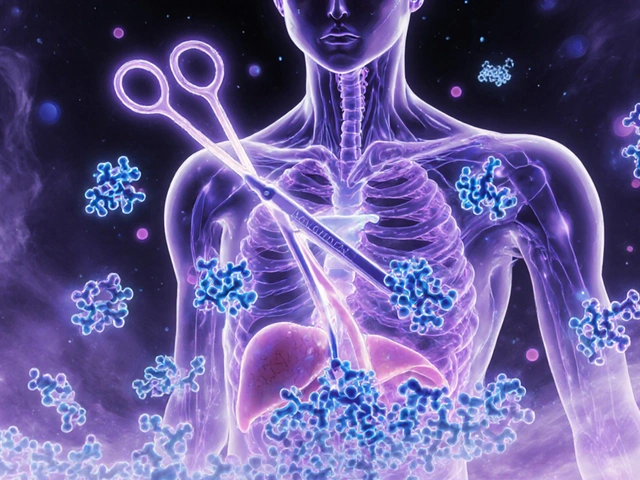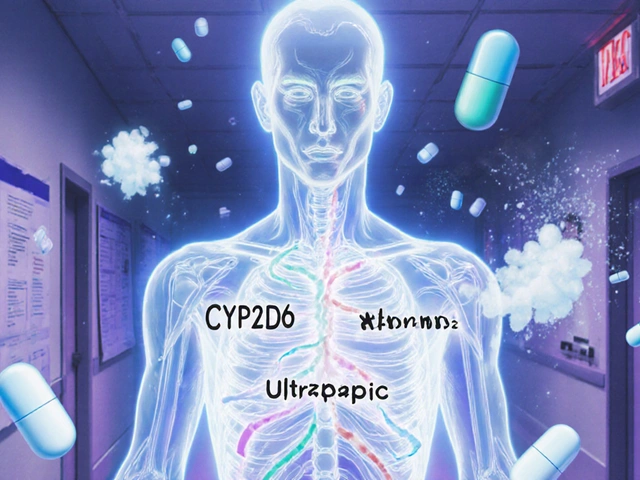SSRI Side Effect Risk Calculator
This tool estimates your relative risk of side effects based on your CYP2C19 or CYP2D6 metabolizer status. Results are based on data from over 5,800 patients across 13 studies.
When you start an SSRI like sertraline or escitalopram, you’re not just taking a pill-you’re triggering a complex chemical dance inside your body. For some people, it works smoothly. For others, the side effects hit hard: nausea, dizziness, insomnia, or worse. Why does this happen? The answer might be written in your genes-specifically in two enzymes: CYP2C19 and CYP2D6.
What Are CYP2C19 and CYP2D6?
These are liver enzymes that break down medications. Think of them as molecular scissors. When you take an SSRI, your body needs these enzymes to process it-too slow, and the drug builds up; too fast, and it never reaches the level needed to help. CYP2C19 handles citalopram, escitalopram, and sertraline. CYP2D6 deals with fluoxetine, paroxetine, and venlafaxine. Both are highly variable across people because of genetic differences.
Over 100 versions of CYP2D6 and 35 of CYP2C19 have been identified. These aren’t just small tweaks-they change how the enzyme works. Based on your DNA, you’re classified as a poor, intermediate, normal, rapid, or ultrarapid metabolizer. This isn’t theoretical. A 2024 study showed that CYP2C19 poor metabolizers have 2.3 to 3.5 times higher levels of escitalopram in their blood than normal metabolizers. That’s not a minor difference-it’s the difference between tolerating the drug and being hospitalized.
How Genes Change Your Side Effect Risk
Let’s say you’re a CYP2D6 poor metabolizer and you’re prescribed venlafaxine. Your body can’t clear it efficiently. The drug piles up. A 2023 study found these patients are 2.7 times more likely to suffer serious side effects like dizziness, heart palpitations, or confusion. One case described a 45-year-old woman who got severe nausea and insomnia on 75 mg of venlafaxine. After genetic testing, her dose was cut in half-and her symptoms vanished.
On the flip side, ultrarapid metabolizers clear drugs too fast. A patient on 20 mg of escitalopram might feel nothing. No improvement. No relief. But when their dose was doubled to 40 mg, based on their CYP2C19 status, they finally started feeling better. That’s not a fluke-it’s predictable biology.
For paroxetine, CYP2D6 poor metabolizers are 3.2 times more likely to report severe side effects. For citalopram, CYP2C19 poor metabolizers report 2.8 times more side effects. These aren’t rare outliers. They’re patterns backed by data from over 5,800 patients across 13 studies.
Why Doesn’t It Always Work?
Here’s the catch: having a slow or fast metabolism doesn’t always mean the drug won’t work. A large 2024 study found that while CYP2C19 status strongly affects how much drug is in your blood, it doesn’t always predict whether you’ll feel better. That’s because depression isn’t just about drug levels. Your brain chemistry, stress levels, sleep, and even gut health matter too.
Some people with perfect metabolizer status still get terrible side effects. Others with poor metabolism feel fine. That’s why experts say pharmacogenomics isn’t a crystal ball-it’s a tool. Dr. Pedro Ruiz from the University of Miami put it plainly: “It’s one piece of the puzzle.”

Who Should Get Tested?
You don’t need to be tested before every antidepressant. But if you’ve tried one or two SSRIs and had bad side effects-or if you’ve had no improvement despite adequate doses-testing makes sense. It’s especially useful if:
- You’ve had a bad reaction to an SSRI before
- You’re on multiple medications (like a painkiller and an antidepressant) that both use CYP2D6
- You’re planning to start a drug like paroxetine or venlafaxine, which are tightly controlled by CYP2D6
- You have a family history of bad reactions to antidepressants
Testing isn’t magic. But for people stuck in a cycle of trial-and-error, it can cut months off the process. One 2022 analysis estimated it saves $1,200 to $1,800 per patient by reducing failed prescriptions and ER visits.
How the Test Works
It’s simple: a cheek swab or blood sample is sent to a lab. The test looks for specific variants in CYP2C19 and CYP2D6 genes. Results come back in 1-3 weeks. The lab doesn’t just say “you’re slow”-it gives you a metabolizer category and recommends dose adjustments based on CPIC guidelines.
Not all tests are equal. Standard DNA tests from companies like 23andMe won’t cut it. They miss key variants, especially in CYP2D6, because of complex gene structures. You need a pharmacogenomics-specific test-like those from Mayo Clinic, Labcorp, or Invitae.
Doctors need training too. The American Psychiatric Association offers a 6-hour course to help interpret results. Without it, a report saying “CYP2D6 intermediate metabolizer” can be misread as “just a little slow”-when it might mean you need half the dose.

Insurance and Access
As of mid-2024, only 62% of U.S. insurers cover these tests for antidepressants. In New Zealand, coverage is even more limited. Many patients pay out-of-pocket-around $300-$500. That’s expensive. But if you’ve spent $2,000 on three failed antidepressants and two therapy sessions, it starts to look like a smarter investment.
Some clinics now offer bundled services: test + pharmacist review. Board-certified pharmacogenetics specialists-there are about 1,200 in the U.S.-can help translate the results into real dosing changes. You don’t have to figure it out alone.
The Bigger Picture
Pharmacogenomics isn’t just about SSRIs. The April 2023 CPIC guidelines now include five genes: CYP2D6, CYP2C19, CYP2B6, SLC6A4, and HTR2A. That means future tests might look at serotonin transporters and receptor genes too. The National Institutes of Mental Health just launched a $15.2 million trial called GUIDED-2, tracking 5,000 patients with treatment-resistant depression to see if genetic guidance leads to better outcomes.
By 2026, some hospitals plan to use polygenic scores-combining CYP genes with other markers-to predict response more accurately. But for now, CYP2C19 and CYP2D6 are the most proven.
What to Do Next
If you’re struggling with SSRI side effects:
- Write down every side effect you’ve had and which drug caused it.
- Ask your doctor if pharmacogenomic testing is right for you.
- Ask which lab they use-make sure it’s a pharmacogenomics-specific test, not a general DNA screen.
- Request a copy of your results and ask for help interpreting them.
- Consider talking to a clinical pharmacist trained in pharmacogenomics.
There’s no guarantee it’ll fix everything. But if you’ve been stuck for months, it’s one of the few tools that gives you a biological reason for what’s happening-and a path forward.
Is pharmacogenomic testing worth it for SSRIs?
It’s worth considering if you’ve had bad side effects or no improvement with standard doses. Studies show it reduces trial-and-error prescribing and cuts costs by $1,200-$1,800 per patient. For people with CYP2D6 or CYP2C19 poor metabolizer status, it can prevent dangerous drug buildup. But it’s not a guarantee of success-it’s a guide to avoid the worst outcomes.
Can I get tested through my regular doctor?
Yes, but not all doctors are trained to order or interpret the test. Ask if your doctor has experience with pharmacogenomics. If not, they can refer you to a psychiatrist or clinic that specializes in it. Some labs offer direct-to-consumer testing with physician oversight, which can be easier to access.
Do all SSRIs use CYP2C19 and CYP2D6?
No. CYP2C19 mainly handles citalopram, escitalopram, and sertraline. CYP2D6 handles fluoxetine, paroxetine, venlafaxine, and duloxetine. Other SSRIs like fluvoxamine and mirtazapine use different pathways. Your test should match the drug you’re taking or plan to take.
What if my test shows I’m a normal metabolizer?
That’s good news-you’re likely to tolerate standard doses. But it doesn’t mean you won’t have side effects. Other factors like age, liver function, other medications, and even diet can still affect how you respond. Normal metabolizer status just means your genes aren’t the main problem.
Are there risks to getting tested?
The test itself is low-risk-just a swab or blood draw. But there are psychological risks. Some people feel discouraged if results show they’re a poor metabolizer. Others get false confidence from a "normal" result and don’t seek other help. Always pair testing with clinical support. The FDA warns against using genetic results alone to make treatment decisions.


